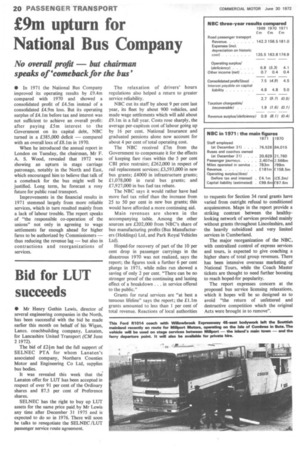£9m upturn for National Bus Company
Page 22

If you've noticed an error in this article please click here to report it so we can fix it.
No overall profit but chairman speaks of 'comeback for the bus'
• In 1971 the National Bus Company improved its operating results by £9.4m compared with 1970 and showed a consolidated profit of £4.5m instead of a consolidated £4.9m loss. But its operating surplus of £4.1m before tax and interest was not sufficient to achieve an overall profit: after paying £5m interest to the Government on its capital debt, NBC turned in a £385,000 deficit compared with an overall loss of £8.1m in 1970.
When he introduced the annual report in London on Tuesday, the chairman, Mr F. A. S. Wood, revealed that 1972 was showing an upturn in stage carriage patronage, notably in the North and East, which encouraged him to believe that talk of a comeback for the bus might well be justified. Long term, he forecast a rosy future for public road transport.
Improvements in the financial results in 1971 stemmed largely from more reliable services, which in turn resulted mainly from a lack of labour trouble. The report speaks of "the responsible co-operation of the unions" not only in agreeing to wage settlements far enough ahead for higher fares to be authorized by Commissioners thus reducing the revenue lag but also in contractions and reorganizations of services. The relaxation of drivers' hours regulations also helped a return to greater service reliability.
NBC cut its staff by about 9 per cent last year, its fleet by about 900 vehicles, and made wage settlements which will add about 19.1m in a full year. Costs rose sharply, the average per-capitum cost of labour going up by 16 per cent. National Insurance and graduated pensions alone now account for about 4 per cent of total operating cost_ The NBC received £7m from the Government to compensate it for the effects of keeping fare rises within the 5 per cent CBI price restraint; 1262,000 in respect of rail replacement services; £3,593,000 in new bus grants; £4000 in infrastructure grants; £1,078,000 in rural bus grants; and £7,927,000 in bus fuel tax rebate.
The NBC says it would rather have had more fuel tax relief than the increase from 25 to 50 per cent in new bus grants; this would have afforded a more continuing aid.
Main revenues are shown in the accompanying table. Among the other sources are £202,000 from NBC's share of bus manufacturing profits (Bus Manufacturers (Holdings) Ltd, and Park Royal Vehicles Ltd).
Hoped-for recovery of part of the 10 per cent drop in passenger carryings in the disastrous 1970 was not realized, says the report; the figures took a further 6 per cent plunge in 1971, while miles run showed a saving of only 2 per cent. "There can be no stronger proof of the continuing and lasting effect of a breakdown. .. in service offered to the public."
Grants for rural services are "at best a tenuous lifeline" says the report; the £1.1m grants amounted to less than 1 per cent of total revenue. Reactions of local authorities to requests for Section 34 rural grants have varied from outright refusal to conditioned acquiescence. Maps in the report provide a striking contrast between the healthylooking network of services provided mainly without grants throughout Lincolnshire, and the heavily subsidized and very limited services in Cumberland.
The major reorganization of the NBC, with centralized control of express services and tours, is expected to give coaching a higher share of total group revenues. There has been intensive overseas marketing of National Tours, while the Coach Master tickets are thought to need further boosting to reach hoped-for popularity.
The report expresses concern at the proposed bus service licensing relaxations, which it hopes will be so designed as to avoid "the return of unfettered and destructive competition which the original Acts were brought in to remove".




























































































